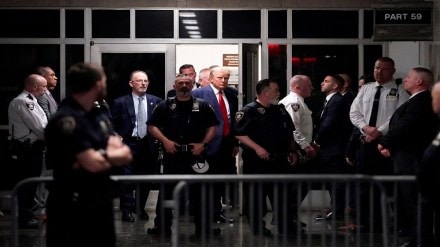Former President of US Donald Trump faced another round of legal challenges as he pleaded not guilty to federal crimes for the second time in two days. This time, the charges stemmed from new allegations in Florida related to his handling of classified documents. The indictment accused him of conspiring with his valet and another employee at his Mar-a-Lago estate to delete video surveillance footage that contained evidence pertaining to the classified documents. Trump submitted his plea in a one-page court filing, choosing not to appear in court for a new arraignment.
Just the day before, Trump had pleaded not guilty to charges of conspiring to steal the 2020 election in Washington. Prior to that, on June 13, he had already entered a not guilty plea to the first set of charges in the classified-documents case.
‘Threatening’ social media post
In a late-night court filing, US prosecutors brought attention to a concerning social media post from Trump on his Truth Social site. The post, which read, “IF YOU GO AFTER ME, I’M COMING AFTER YOU!”, raised alarms as it indicated a possibility of intimidating witnesses and improperly disclosing confidential evidence provided by the government.
Prosecutors argued that such behaviour could have a detrimental effect on the fair administration of justice, considering Trump’s history of attacking judges, attorneys, and witnesses in other cases against him.
Trump had previously sworn at his arraignment not to intimidate witnesses or communicate with them without legal counsel present.
Dropping Georgia lawsuit, promising new case
Adding to the legal challenges, Trump’s lawyers hinted at the possibility of pursuing further legal action in Georgia. The aim was to prevent what could be the former president’s fourth indictment in five months, this time concerning his alleged attempt to overturn the outcome of the 2020 election in the pivotal swing state.
His legal team withdrew a suit that sought to compel a Georgia state judge to rule on Trump’s request to discard evidence gathered by an Atlanta special purpose grand jury and to disqualify Fulton County District Attorney Fani Willis from the investigation. Although they disagreed with the analysis and ruling of Fulton County Superior Court Judge Robert McBurney, Trump’s lawyers stated in a motion that there were alternative channels to seek judicial review of the special grand jury and Willis’s involvement in the probe.
As the legal battles continued to unfold, the former president remained steadfast in asserting his innocence against the charges and allegations, setting the stage for a protracted legal process with potentially far-reaching consequences.
(With inputs from Bloomberg)
